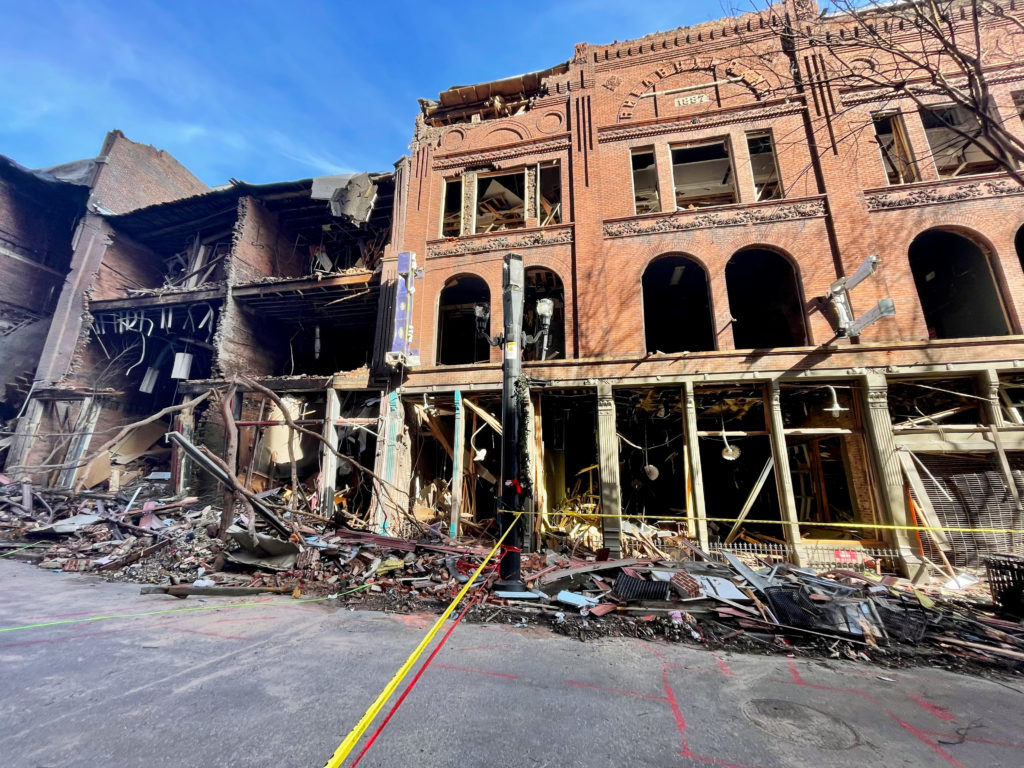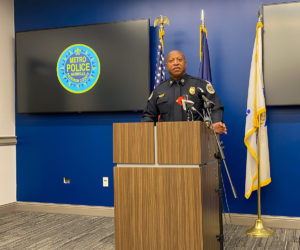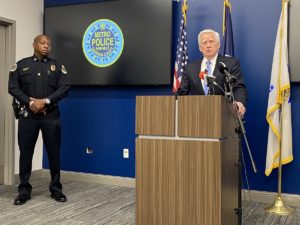
Nashville police are changing how they investigate bomb threats after a committee analyzed their handling of a 2019 tip that an Antioch man was building an explosive. The department never made contact, and the man went on to detonate his RV on Second Avenue downtown on Christmas morning last year.
Police Chief John Drake says officers responding to the initial allegations did what they were supposed to, but that a five-person review panel found “deficiencies” in the follow-up process. They want better coordination and documentation.
“While the committee concluded that there is no way to know for sure whether the Christmas Day bombing could have been prevented, and that patrol officers followed protocols and procedures during the August 2019 call, deficiencies were identified in the follow-up investigative process,” Drake said in a statement. “It is of paramount importance to all of us that any deficiencies are corrected.”
More: Read the downtown bombing “after-action” report. (PDF)
Police say some changes have already been made, like beginning a quarterly audit of case files and convening a monthly explosives summit with state and federal law enforcement.
Other updates are still coming, like implementing a four-step process to confirm facts before marking cases “inactive,” and reminding all officers of the legal resources that can determine probable cause to seek search warrants.
The department will also assign a full-time liaison to the region’s Joint Terrorism Taskforce — a position that has recently been only part time — and more regularly file suspicious activity reports into a state database.
The Findings
The eight-page report, which is the result of about five months of investigation following the Christmas bombing, highlights both what went well in the initial response to the 2019 report and what could have been done better.
The committee says patrol officers “acted appropriately to a 911 call that a potentially suicidal person had access to weapons” by informing their supervisors, removing the weapons from the scene, interviewing the woman who was threatening to harm herself and getting her medical assistance. Officers also documented the interaction according to policy.
 Samantha Max WPLN News
Samantha Max WPLN NewsMNPD Chief John Drake shares the findings an investigation into the department’s handling of a 2019 report against the man who detonated a bomb in downtown Nashville.
Investigators felt that officers and supervisors at the scene took the woman’s concerns about Anthony Warner building a bomb seriously and that several people immediately went to his home to investigate. However, the officers never tried to search the home, because they didn’t feel they had probable cause. A Hazardous Devices Unit asked the FBI to search Warner’s name in several federal databases, but his name didn’t raise any flags.
At that point, officers stopped investigating. That’s when the committee says the department made a mistake. Their report outlines multiple additional steps officers could have taken to follow up on the bomb threat, including re-interviewing the woman who said Warner was building bombs after she received medical care and interviewing Warner’s employer, family members and neighbors.
Investigators recommended multiple additional policy updates to prevent future lapses in bomb threat investigations.
They say officers should better document every step in their investigations, rather than relying on memory. They also suggested that all bomb-related incidents be investigated with help from both precinct detectives and the Hazardous Devices Unit and that the HDU improve its communication with the Special Investigations Division. Plus, they think that MNPD executive staff should always be kept in the loop when there is a “significant investigation” into a bomb or terrorism threat.
Drake says the department will accept all of the committee’s recommendations.
“We’ve been getting bomb threats for years, and this is the one that finally detonated,” Drake says. “But it put us in a place where we need to make sure we have safeguards in place.”
‘Hindsight is 20/20’
The chief was quick to defend his officers after news broke of the prior report against Warner in the days following the bombing.
“I believe the officers did everything they could, legally. Maybe we could have followed up a little more. Hindsight is 20/20,” Drake told reporters in late December.
More: Listen to criminal justice reporter Samantha Max’s January interview Drake.
But now that the after-action review committee has completed its report, Drake admits that there was, in fact, more that officers could have done.
“Hindsight is 20/20,” Drake repeated at a press conference Wednesday morning. “I wanted this review to expose any deficiencies to make us better as an agency, better as a city when we respond to these type of incidents.”
One question still unresolved by the report, however, is officers’ decision not to seek a warrant to search Warner’s home and RV.
The committee found that HDU officers should have sought legal advice about search warrants during their investigation. Moving forward, they recommend that officers receive additional training about probable cause, the legal criteria that allows law enforcement to search a person’s property without their permission. Following the bombing, multiple legal experts told WPLN News they believed police could have gathered more information in order to apply for a search warrant.
 Samantha Max WPLN News
Samantha Max WPLN News“It is impossible what if anything could have prevented this terrible incident,” Ed Yarbrough, chair of the after-action review committee, said at a press conference on June 2.
But the chair of the committee didn’t go so far as to say that officers could have prevented the bombing “had they looked harder.”
“We don’t know that any judge would have granted a search warrant based on the information they had,” says former U.S. Attorney Ed Yarbrough, adding that it’s unclear what officers would have even found if they’d gotten a warrant and conduct a search.
“This is a year and four months before the bomb itself was detonated,” he says. “So, he may have had baking soda on the table. We can’t arrest a man for having baking soda on the table.”
Yarbrough says the failure to conduct a search was a point of contention within the committee, though he didn’t elaborate on specific agreements between members. Other investigators include Metro Councilmember Jennifer Gamble, MNPD Deputy Chief Dwayne Green, MNPD Professional Standards Director Kathy Morante and Metro Nashville Community Oversight Executive Director Jill Fitcheard.
“That process was long, and I thought it was productive,” Fitcheard told Community Oversight Board members at a meeting last month. “We interviewed lots of witnesses — police witnesses as well as civilian witnesses. And so, I think that our report is very thorough and very fact-based.”
This story was updated at 12:56 p.m.

